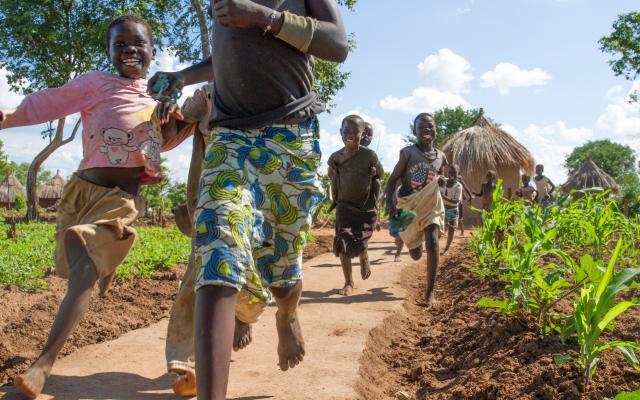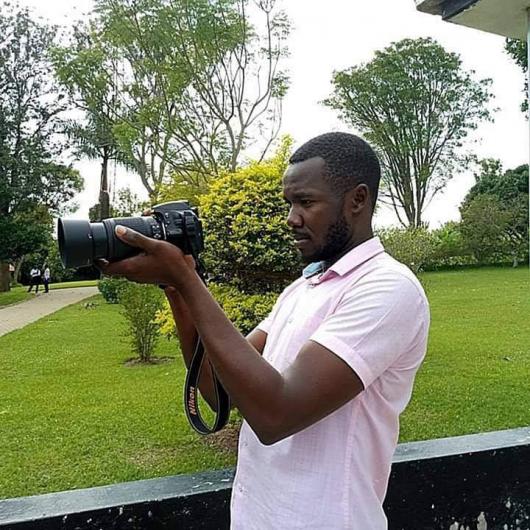
Since March 2020, schools in Uganda have been closed because of the COVID-19 pandemic. In Bidibidi refugee settlement, one of the largest in the world hosting over 280,000 refugees mainly from South Sudan, more than 80,000 children have been affected. Photo: Kieran Doherty/Oxfam
Angelina Daniel is only 13 years old, but already she is an active member of her community. She’s an advocate against child marriage, and through a music programme run by the organization I CAN, she has recorded several songs about peace, and hopes to one day become a musician. “My greatest inspiration is Dr Franko,” she says. “He is South Sudanese like me”.
Aside from music, Angelina loves school. “My favourite part about school was the fun things I did with my classmates. We used to mime, sing, narrate stories, draw pictures and dance togetherr. I really miss that.”
Her friend Bosco Taban is also a student in Bidibidi refugee settlement and a budding musician. He is trying to make the most of the lockdown, but it is hard to remain optimistic he says. “I had the hope of leaving primary school level this year, but because of COVID-19, now I don’t even know what to do. My parents have been advising us but things like teaching us at home, there is no one. My hope however is that the lockdown will soon be lifted, and we go back to school.”
No access to learning tools
Since March 2020, schools in Uganda have been closed because of the COVID-19 pandemic. 15 million learners in the country have been affected, including 600,000 refugee children. In Bidibidi refugee settlement, one of the largest in the world hosting over 280,000 refugees mainly from the Equatoria region in South Sudan, more than 80,000 kids have been affected.
The government of Uganda and international agencies have put measures in place to ensure that children do not lose out completely on their education. The Ministry of Education and Sports in partnership with UNICEF and other partners have supported the printing and distribution of learning materials for primary and secondary schools. Lessons are also being broadcast on TV and radio stations. But both Bosco and Angelina say they have no access to any of these tools. “I know that there are lessons going on on several radios and televisions since government shutdown schools, but I do not attend simply because we do not have a radio set or television screen at home,” says Angelina.
So instead, Angelina helps her mother earn some money. The family last saw their father in 2016 when he escorted them to Nimule-Elugu boarder to seek refuge in Uganda. Since then, they haven’t heard from him although Angelina believes that he is still alive. “I have to help my mother. I have three siblings and she is the one looking after all of us. Now that I am not in school, I have been selling pancakes and greens by the roadside to raise some money for grinding our maize. I also help my mother with the cooking.”
“Those people want me to get married against my will”
For many refugee children, school is not just a place where they go to learn, but it also provides structure and a refuge from the harshness of life outside. For many vulnerable children, schools are where they get safe water, food and mental health support. Without it, they are exposed to sexual, physical and psychological abuse.
Janet Akwero is 17 and also lives in Bidibidi refugee settlement. She has been badly affected by the nationwide closure of educational institutions. She lost both her parents during the civil war between the reinstated First Vice President of South Sudan, Dr. Riek Machar and President Salva Kiir.
An orphan, Janet Akwero fled to Uganda with her uncle who she says has been mistreating her since they were in South Sudan.
“Those people do not treat me well and they don’t love me. They want me to get married against my will, so that they can get rid of me. They don’t buy for me inessential things like cloths and they force me to cook but deny me the food I have cooked. Sometimes they beat me up,” Janet Akwero explains.
Aside from the mental and physical abuses that she gets at home, Akwero is worried about her future academic journey. Without the support of her uncle, she finally got the chance to study through a programme run by Windle Trust International. But now that she is stuck at home, she’s afraid that she too will be forced to marry.

Children play near their homes at the Bidibidi refugee settlement. Photo: Coco McCabe/Oxfam
Social and musical education to help unaccompanied children
Janet is not the only one in this predicament. Angelina says that “since lockdown up to today, I have not seen my classmates. I have heard that some have gotten married. They used to give me hope and joy, but I am worried that most will get pregnant during the lockdown and I may never see them again at school.”
Ms Mary Bayoa is the Education Secretary in Village 7 in the settlement and she has seen the effects that the school closures have had on young people in the settlement first hand. “There is nothing students are doing at the moment. I don’t even know how to help them. In Bidibidi Refugee Settlement, we don’t have radio and television stations to maintain learning while our children are at home”. Ms Bayoa has focused her attention on cautioning parents and guardians against marrying off their daughters during the lockdown. She has been warming them that child marriage is punishable by law. But she is frustrated.
She says that many teenagers have gotten pregnant as a result of the COVID-19 lockdown and that their parents do not report the cases to the local justice system and other relevant authorities in the settlement. “In most cases, the parents will tell us that they have settled the issue at home and there is nothing that leaders in the community can do about it.” Mary recommends that these girls are given sex education and that radios should be distributed to every household to allow children catch up through online learning.
She, and others working in the camp have noticed the effect that lockdown is having on the children and young adults. I CAN is a refugee-led Community-Based Organization (CBO) operating in Bidibidi Refugee Settlement. It was founded in 2017 by refugee youths Stephen Wandu Bimo, Faustino Seme Ludanga, and Angela Kyobutungi. The organization uses social and musical education to help unaccompanied refugee children in Bidibidi heal their trauma and create friendships across the tribal-divide that led to the South Sudanese civil war.
Psychological trauma
According to Stephen Wandu, “We are alarmed by the growing number of cases of psychological trauma we are seeing amongst the refugee youth that we work with. We ourselves have experienced the trauma of war and we know the importance of supporting teenagers during this difficult time.” The organization is battling against the more pervasive effects of the COVID-19 by providing children with a different kind of sanctuary.
“We are finalizing the construction of Children Music Centre in Village 14 where we will offer children trauma healing therapy and counselling. We have also started door to door family visits to meet children, listen to them and counsel them on their situation. If children are not provided with a routine of learning at home to replace school, they will face increased protection risks such as physical and sexual abuse, hazardous and exploitative work, child marriage and early pregnancy. And if the closure of schools persists, I fear that Uganda will register its highest rates of school primary and secondary school dropouts and teenage child marriages in 2020 and 2021. There will also be additional burden on girls, who at home often absorb extra work of caring for other children and are more exposed to domestic violence,” says Stephen Wandu.
For Bosco, despite the despair he sometimes feels, he has focused his attention on helping his former classmates by offering them music coaching and advise throughout the lockdown. “My message to my fellow children and parents is that children should always revise their books. I know that some children have lost hope, but I know this lockdown will not be forever.”
About I CAN
I CAN South Sudan is a registered, refugee-led Community-Based Organization (CBO) operating in Bidibidi Refugee Settlement, Yumbe District, in Northern Uganda. They are currently helping 100 children annually, using social and musical education to help unaccompanied refugee children in Bidibidi settlement. I CAN South Sudan is working in Uganda under the Department of Child Protection OPM (Office of the Prime Minister Refugee). It’s a member of Children Music Network - USA, Member of West Nile Humanitarian Platform and Member of Network of South Sudan Civil Society Organizations in Uganda.

About the author
Moses Phillip Dananyeno Sakondo is a 24 year old South Sudanese refugee, a journalist and human right activist working with unaccompanied refugee children in Bidibidi Refugee Settlement Yumbe District in Northern Uganda. Sakondo is the Public Relations Manager of I CAN South Sudan, director of UMU Spotlight, the official newspaper of Uganda Martyrs University and managing director of MBI VOX.